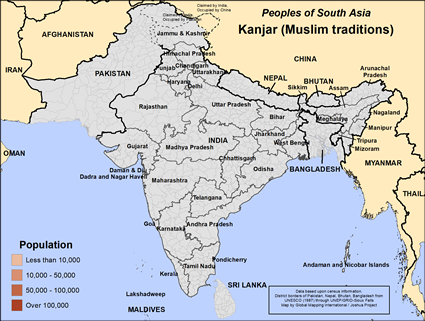Kanjar (Muslim traditions) in India

Send Joshua Project a photo
of this people group. |

Map Source:
People Group data: Omid. Map geography: UNESCO / GMI. Map Design: Joshua Project
|
| People Name: | Kanjar (Muslim traditions) |
| Country: | India |
| 10/40 Window: | Yes |
| Population: | 15,000 |
| World Population: | 26,000 |
| Primary Language: | Hindi |
| Primary Religion: | Islam |
| Christian Adherents: | 0.00 % |
| Evangelicals: | 0.00 % |
| Scripture: | Complete Bible |
| Ministry Resources: | Yes |
| Jesus Film: | Yes |
| Audio Recordings: | Yes |
| People Cluster: | South Asia Muslim - other |
| Affinity Bloc: | South Asian Peoples |
| Progress Level: |
|
Introduction / History
These Muslims speak Urdu. This unreached people group lives in Uttar Pradesh, Bihar, Rajasthan, Madhya Pradesh, and Karnataka.
What Are Their Lives Like?
Some work in mills. In Karnataka, many of the Kanjar work as day laborers. They use modern medicine. Boys are educated to secondary level.
They are monogamous, meaning that one husband has one wife. The caste council must approve the remarriage of divorcees. On the death of the father, sons inherit the property. They have birth and marriage rituals.
In Uttar Pradesh the Kanjar work in agriculture. They have a low literacy level, so the gospel will need to be given in oral form too as in Rajasthan where they speak Mewari and Hindi.
In Bihar again the literacy level is low. They speak Hindi and read and write in Devanagari. They hunt, and many are self-employed. They are semi nomadic.
What Are Their Beliefs?
Though there is a Hindu majority among the Kanjar people, there is a separate community for those who are Sunni Muslim. Sunnis believe that the supreme God, Allah, spoke through his prophet, Mohammed, and taught mankind how to live a righteous life through the Koran and the Hadith. To live a righteous life, you must utter the Shahada (a statement of faith), pray five times a day facing Mecca, fast from sunup to sundown during the month of Ramadan, give alms to the poor, and make a pilgrimage to Mecca if you have the means. Muslims are prohibited from drinking alcohol, eating pork, gambling, stealing, slandering, and making idols. They gather for corporate prayer on Friday afternoons at a mosque, their place of worship.
The two main holidays for Sunni Muslims are Eid al Fitr, the breaking of the monthly fast and Eid al Adha, the celebration of Abraham's willingness to sacrifice his son to Allah.
Sunni religious practices are staid and simple. They believe that Allah has pre-determined our fates; they minimize free will.
In most of the Muslim world, people depend on the spirit world for their daily needs since they regard Allah as too distant. Allah may determine their eternal salvation, but the spirits determine how well we live in our daily lives. For that reason, they must appease the spirits. They often use charms and amulets to help them with spiritual forces.
What Are Their Needs?
These people need to realize that they cannot please God without being empowered by the Holy Spirit. They cannot have the Holy Spirit without Jesus Christ, the only savior.
Prayer Points
Pray for a movement of Jesus to heal and strengthen Muslim Kanjar communities.
Pray for the Kanjar people to understand and embrace that Jesus wants to bless their families and neighborhoods.
Pray for Holy Spirit anointed believers from the Kanjar people to change their society from within.
Pray for a movement in which the Holy Spirit leads and empowers disciples to make more disciples.